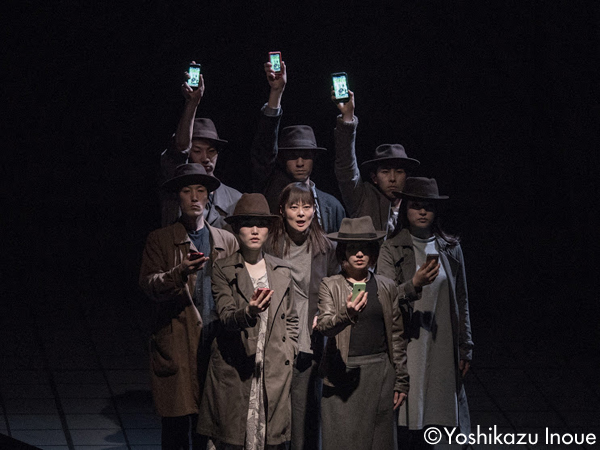A 500,000 : 1 scale map of the city ruffles in the wind, and in the darkness we hear the voice of a man (Cloud = central figure) saying, “Now, let’s start the game.”
Cloud hurls out a chain with something attached to its end, and where it lands, map-making agents rush to drive a stake into the ground at the spot where it has landed. The stakes then define the boundaries of the city, and each time a chain is thrown and a new stake is driven into the ground, the boundary of the city expands, changing the city’s appearance moment by moment. What Cloud has been throwing out on the chains is Hammer, the opener of portals (entrances, holes). Every time he is thrown out, new portals open in the city, where houses are then built roads laid down, people take up residence and the city grows.
A woman is riding a motorcycle continuously on the national highway running east and west and the expressway running north and south.
Men and Women are dancing all night at a club named Waiting Room that stands on the boundary of the city. They citizens of the city who can’t return. Here, we suddenly see Hammer, who now has a gun in hand. Hammer uses the gun to open holes (portals) wherever he is thrown, as he continues to search for Cloud.
A crowd of people are amusing themselves by playing a game on their smartphones. In this game, when they open up an actual map on their smartphone, a virtual portal appears. The portals are full of mysterious substances, so the Blue Agents say, “It looks dangerous, so let’s block it up.” But on the other hand, the Green Agents say, “If we expose ourselves to it, we can make ourselves evolve,” and so they begin hacking into the portal to win new territory in the game.
At regular intervals there are radio broadcasts from JATIC (Japan Traffic Information Center) with an announcer reporting of the status of traffic jams on the expressways. As if calling out to listeners in a give-and-take with these announcers, DJ Cloud says in a lively voice, “Come on, everyone, get out and find all of the worm holes (portals) you can in the maps.”
In a new residential area of the city with airplanes flying overhead, a woman sits in a room in a “culture residence” (apartment) listening to the radio. In the same “culture residence,” Hammer is talking into a video camera about his gloomy thoughts, firing his gun at the wall and saying, “I’m going out to open up holes in the town,” and goes out again.
In the town there are shopping malls, Pachinko parlors, rows of high-rise condominiums, old rundown housing projects, convenience stores and culture residences. A woman on a motorcycle rides east through the cityscape on the national highway named the Tropic Line.
When a supermarket and a DIY store are completed, a Pachinko parlor complete with parking lot is built and a “Town Outside the Town” takes form along the roadside. The voice making an announcement inside the Pachinko parlor thanking all the customers for coming is that of Cloud.
In the evening we see a caravan-like line of Agents going home after work. Hammer leaves the line and returns to his culture residence, the woman listening to the radio is waiting there. Looking at a map, Hammer tells the woman about his hometown.
From there, the two dive [through a portal] to that hometown and begin to play a game of Fukuwarai (like pin the tail on the donkey) with the parts of a face scattered across a tabletop. Through the hole of the face’s mouth, Hammer peeks at the woman as he tells a story of three kings who live in the Center of the World, the South Sea and the North Sea respectively. Then he opens another hole [portal] and goes out again, not hearing the woman’s call for him not to leave.
The scene changes to a part of town where there are agents gathered around portals that have been opened in the internet café named Cram School, the rental video shop named Install, the shuttered small shops and the vending machines in front of the liquor store.
From Hammer’s culture residence we hear people conversing in Korean and the sound of meat being grilled. At the club Waiting Room, imperfect citizens of the city are dancing. When Hammer asks them where Cloud is, he is told, “You have crossed the city boundaries, you have committed crimes so you are being chased [hunted down].” Hammer shots at them as they dance.
Maps full of holes are spread out at [and area of] the airport named Empty Lot, where again Cloud and Hammer have met. Hammer asks Cloud, “Why do you throw me?” Cloud answers, “I just want to throw something heavy a long distance.” Cloud grabs Hammer’s hand and throws him again.
In front of a signpost with signs pointing in all directions reading Cape Town 14,322km, Matterhorn 9638km, Roppongi Hills 401km, Koshien Stadium 11km, Elementary School 390m …, a group of people are standing, all holding maps. They line up the maps as if playing a game of Fukuwarai.
Like a god at the center of the universe, Cloud shouts: “OK, let’s all start the game.”
The sound of the second hand announces the approach of the hour. It is another day’s reporting of the time. And the city continues to grow.




